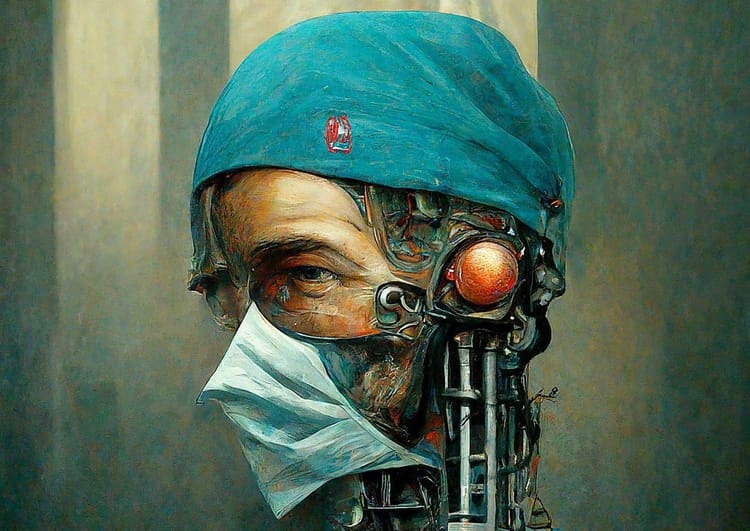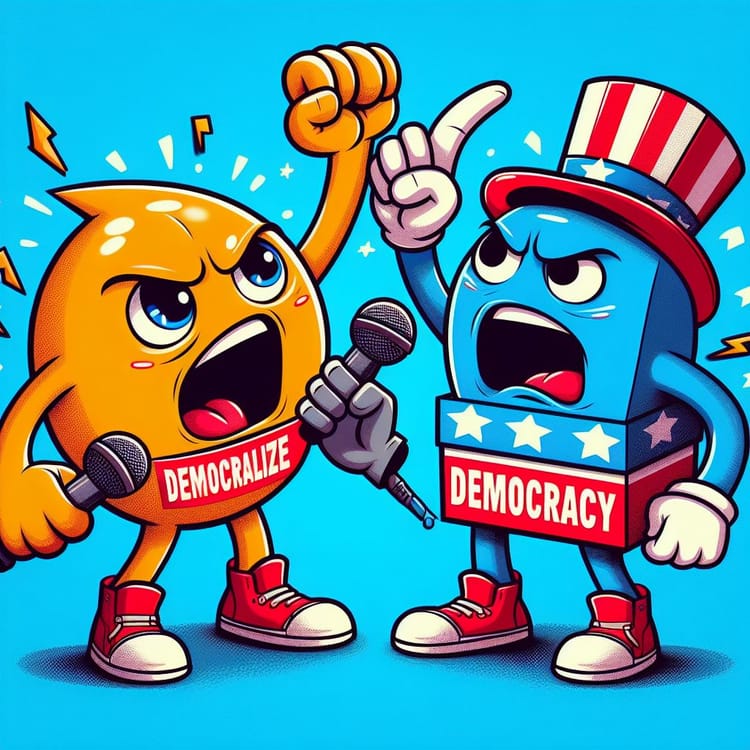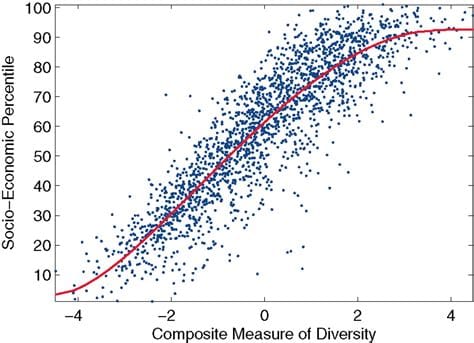Kant vs Hobbes

Is humanity fundamentally good or bad? The debates continue in this week's tour of recent research. The real question is probably when and why do we fail to be the person we want to be, and what can tip the balance away from a brutish and short life.
Normalizing Villains
Do we normalize villains? In business, for example, "firms in the top quintile of racial discrimination are responsible for nearly half of lost contacts to Black [job] applicants"…
“Systemic Discrimination Among Large US Employers”
In policing, "minorities are less likely to receive a discount on their speeding tickets than white drivers," but just "40% of officers explain all of the aggregate discrimination." (Clever methodology here, btw)…
“A Few Bad Apples? Racial Bias in Policing”
At university, while "students from marginalized groups reported that they generally felt welcome and respected on campus", "a numerical minority of their peers (around 20%) engage in subtle or explicit forms of discrimination." Further…
“Is discrimination widespread? Testing assumptions about bias on a university campus.”
…"between 5% and 20% of the [university students] treated [experimenter] confederates belonging to marginalized groups more negatively than nonmarginalized confederates."
In every case, the majority of companies, officers, and students—governors, comedians, and movie producers—don't engage in explicit forms of harassment and discrimination. Is that enough?...
Why do we allow small numbers of people to poison relationships between races and genders? Is it enough to tell myself that I'm not a villain as I stand aside and normalize villainy?
The Giving Plague
Have you ever read "The Giving Plague" from @DavidBrin's *Otherness?* Otherness by David Brin
I was so fond back in the '90s that I optioned the story to make a movie. Newly published research on altruism brings this story full circle for me...
In the story, a scientist discovers an emerging viral pandemic, but rather than sickness, the virus spreads altruism. It induces the infected to give blood, with the donations as its vector of transmission...
When the infected ask themselves, "Why am I giving blood," their brains answer, "Because you're a good person." The donation makes them more prosocial to explain, post hoc, why they are donating...
From there the story takes some wonderful (and quite timely) twists and turns. But it leaves the question: Do we actually become more altruistic to feel good about ourselves or for the benefit of others? It turns out there is an answer in Alaska...

When Alaskans were told giving will make them feel better about themselves, they were more likely to donate and gave 23% more. Importantly, it had a "warm-glow" effect that increased giving throughout subsequent year."
An experimental test of fundraising appeals targeting donor and recipient benefits
Our brains read the tea leaves of our behavior, and our behaviors adapt to the stories our brains tell—a constant messy cycle that produces us...and allows for change.
Go give "The Giving Plague" a read. It would make a great show. In the end, my collaborator talked me into filming "Detritus Affected" instead. Read them both and let me know which was the right choice.
Angels and demons reside in you right dorsolateral prefrontal cortex
Can I make you lie or tell the truth by stimulating parts of your brain? Yes, yes I can, or so says several studies focused on the right dorsolateral prefrontal cortex (rDLPFC).
For example, transcranial stimulation of right versus left DLPFC shifts individuals’ tendency to lie when asked to name colors of presented stimuli.
Effect of prefrontal transcranial magnetic stimulation on spontaneous truth-telling
And it isn’t just lying, “perturbing rDLPFC via [transcranial stimulation]...made participants more willing to take bribes as the relative value of the offer increased.”
Brain activation and adaptation of deception processing during dyadic face-to-face interaction
This transcranial “neural modulation alters the concern for generating profits for oneself via taking bribes and reshapes the concern for the distribution inequity between oneself and the briber”.
“Several neural imaging studies have provided evidence that the rDLPFC is correlated with fairness perception” and “stimulation of the rDLPFC” induces people to increasingly perceive similar offers as “unfair”.
So, is it lying or fairness? A clue might come from the function of the LEFT dorsolateral prefrontal cortex (lDLPFC), typically thought of as the source of “working memory”, how much of the world we can keep track of at any given moment.
If we assume that the right and left DLPFC are computationally similar but with differing cortical connectivity, then perhaps lDLPFC is “working memory for things, actions, or memories” while rDLPFC is “’working memory’ for values and relationships”.

Old people are better
Now that I’m getting older myself, it’s good to know that science proves that older people are simply better. Compared with younger adults, older adults exert more effort to help others. And teenagers? Fuckin’ teenagers…
Aging Increases Prosocial Motivation for Effort
Failure to Appear
Text message interventions and redesigned paper forms increased court attendance for those who had committed low-level offenses, leading to 30,000 fewer arrest warrants over a 3-year period.
Behavioral nudges reduce failure to appear for court
I advised a group at Berkeley on a similar project. If kids fail to appear in court for trivial little charges, they often find themselves in juvenile hall instead of at home with a warning. The whole rest of their lives can be defined by that difference.
Just looking at the data, the vast majority of kids should never spend time in detention. Incarceration is a bigger predictor of future incarceration than any crime. These nudges genuinely save lives.
Everybody lies...it's called Facebook
Everybody lies—it's called Facebook... or at least, people lie (to themselves?) about using Facebook. In a recent meta-analysis, self-reported digital media use was "rarely an accurate reflection of logged media use", particularly for "problematic content"…
Another study tracking lying in text messages can be paraphrased, "Everybody lies some of the time; some people lie all of the time"…
Everyday deception or a few prolific liars? The prevalence of lies in text messaging
But it's not just lies. Researchers collected accelerometry, GPS, and audio data for a month as people did...whatever people do. When asked about specific experiences a week later, participants were incorrect 36% of the time, regularly confusing places and days.
The Fallacy of an Airtight Alibi: Understanding Human Memory for “Where” Using Experience Sampling
And a recent NBER working paper revealed that real-estate investors rely on past returns more than their own survey-reported expected returns.
Are Stated Expectations Actual Beliefs? New Evidence for the Beliefs Channel of Investment Demand
Findings like this run through my mind whenever I read headlines like "Workers More Productive at Home" only to learn that they just lazily asked people to introspect.
What a fucking drag
“All racial/ethnic subgroups”—”outside of Black people themselves”—”in all geographic regions” in the US are "less likely to respond to emails from people they believe to be Black”
Whenever I hear someone say, “I treat everyone the same,” I can only assume they mean, “I treat everyone the same as my great grandfather did.”
“Are Americans less likely to reply to emails from Black people relative to White people?”
The paper goes on to lay out a rather dismal set of comparisons: “the public” discriminates more frequently than observed public officials, higher education, and medicine, but less than housing or employment.
Reputational Threat
I sat in on a board meeting years ago in which a sexual harassment scandal at an affiliated organization was the prime topic. By 1 vote, the board cut ties with the other org for the sole reason of “reputational threat”. I was shocked that not a single person made the simple argument that it was wrong.
Overconfident assholes win even as the system loses
Many idolize hyperconfident billionaires and politicians, thinking they see life’s winners. A recent experiment, however, told a different story. Players with very “high levels of confidence” did earn more than their competition, but their behavior actually “decreases the overall earnings” of their entire system bringing about “joint losses”.
When assholes rise to the top, the entire system loses.“Absolute Versus Relative Success: Why Overconfidence Creates an Inefficient Equilibrium”
Once again Is humanity fundamentally good or bad? The debates continue in this week's tour of recent research. The real question is probably when and why do we fail to be the person we want to be, and what can tip the balance away from a brutish and short life.
So...parasites?
Do business degrees make better managers? Managers with business degrees are much less likely to “share profits with their workers” than those without degrees, yet despite this squeeze, business degree holders “show no greater ability to increase sales or profits”.
Do MBA programs just attract a disproportionate share of natural born Scrooges and Skackles? Instead, these extractive practices appear to be a “causal effect of practices and values acquired in business education.”
Hurray! Society is training up its own parasites!
I'm not violent; I just vote for violent people
Bad: Democrats and Republicans both believe their rivals “support for violence” is “245 to 442% higher than actual levels”
Hopeful: “a brief...correction of these misperceptions reduced support for violence by 34% and willingness to engage in violence by 44%” for more than a month.
“Correcting inaccurate metaperceptions reduces Americans' support for partisan violence”
But I’m still worried...
Does a reduction in “support for violence” in a survey translate into fewer votes for political candidates that truck in the language of violence? Feedback dynamics between political elites and voters drive political polarization—it’s not enough to say, “I'm not violent; I just vote for it.”
Conspicuous consumption of status anxiety
What traits predict “status signaling” via “luxury spending”?
- “higher salaries”
- “high inequality” workplaces
- occupying “a lower rank position within the workplace”
Workplace inequality is associated with status-signaling expenditure
It’s interesting that a similar set of factors at the level of whole societies predict inter-group violence. Status-seeking monkeys…we’re all just status-seeking monkeys.
Inequality is just fair
Which is more fair: everyone on a team shares equally in the rewards or the rewards are proportional to effort? It turns out most people “not only prefer the rule that most benefits them but also judge it to be more fair and moral".
Equity or equality? Moral judgments follow the money
In fact, people’s “views about equality and equity change in a matter of minutes as they learn where their interests lie".
But self-interest isn’t the only factor shaping our perception of laziness...
When a proposed policy reduces inequality but "reversed pre-existing income rankings, adults across cultures were twice as likely to reject the transfer”. And this was in an economic game (the “Dictator”) where the income rankings were essentially arbitrary.
Rank reversal aversion inhibits redistribution across societies
High as inequality increases “in the outcomes of an economic game…participants…take greater risks to try to achieve higher outcomes”. High-stakes + low perceived fairness = irrational risk taking.
Less Competition, More Meritocracy?
Even more suspicious minds
I often think of orbitofrontal cortex (OFC) as very much the neural home of me. A recent paper also suggests it is the home of my “stereotypes about members of different social groups”…
The research found that “inferences about others'…warmth and competence” affected “monetary-allocation choices” in an experimental game…
Specifically, when we share more with out-group members we perceive as warm, but share less with out-group members we perceive as competent…
The effects of “stereotypes on behavior”, good and bad and ugly, are “mediated by” computation in the OFC. Since this part of our brains is crucial to decision making and resilience, it’s no wonder that our biases increase as stress and mess increase. There’s only so much of me to go around.




